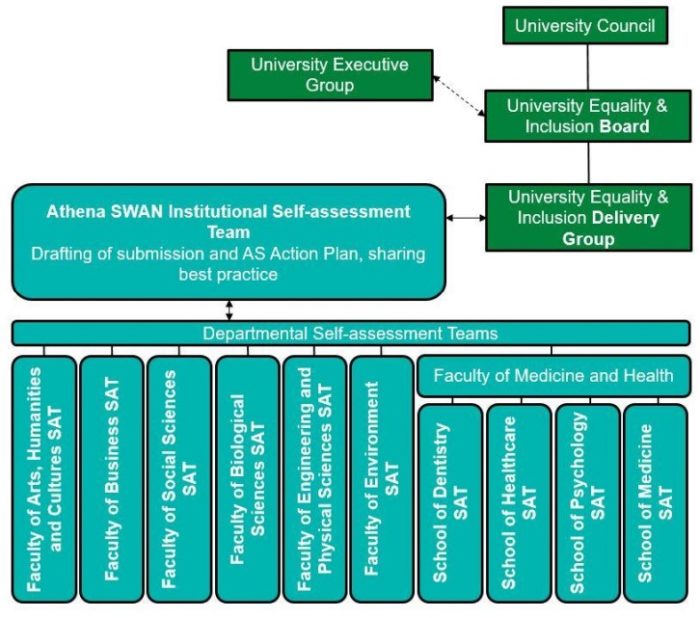Gender Equality Plan (GEP) in Horizon Europe
The University of Leeds meets the Horizon Europe GEP requirements through its 2021 Institutional Athena Swann Bronze Award. The matches are shown in the table below.
In addition to this, certain parts of the University have additional recognition:
| GOLD | SILVER | BRONZE |
|---|---|---|
| School of Medicine | Faculty of Engineering and Physical Sciences Faculty of Biological Sciences Faculty of Environment School of Dentistry School of Healthcare School of Psychology | Faculty of Social Sciences Leeds University Business School |
All documents can be found on the Athena Swan Page.
The University is currently developing its Equality, Diversity and Inclusion (EDI) Framework, which will embed further our high-quality gender principles into all aspects of our work.
Meeting the Horizon Europe GEP Criteria
Publication: Formal document published on the institution's website and signed by the top management
The Athena Swan Charter, managed by Advance HE, is a framework which is used across the globe to support and transform gender equality within higher education and research.
The University of Leeds was awarded a Bronze Award at an institutional level in June 2021. This framework for gender policy was signed by both our outgoing Vice-Chancellor Sir Alan Langlands and the incoming VC Professor Simone Buitendijk. It is published on the University’s Equality and Inclusion Unit web site.
Dedicated resources: commitment of human resources and gender expertise to implement it
The governance structure for Athena Swan is depicted below.

The Institutional Self-assesment Team (ISAT) meets 5 times a year in term-time only and uses remote access to support flexible working and caring needs. The Equality and Inclusion Delivery Group oversees the implementation of the Action Plan and reviews progress, escalating to the Equality and Inclusion Board where necessary. All work is supported by a full-time E&I staff member within the Equality and Inclusion Unit. Every meeting will assess progress against Priority Actions and continue the ‘focussed’ approach to facilitate deeper discussion and bring in new colleagues. We are also setting up an E&I committee structure for staff outside of Faculties (e.g. Professional Services) that are not currently covered within the Athena SWAN award structure. Schools or faculties with their own additional Athena Swan framework will have an extra tier of governance to ensure uptake of the institutional plan as well as to address any field-specific challenges in gender equality.
On the research side, the Centre for Interdisciplinary Gender Studies (CIGS) works to ensure that evolving issues in gender parity are recognised and included in our actions. CIGS has excellent connections with Gender and Women’s Studies departments at universities regionally, nationally and internationally and many of its students and visiting academics are from countries across Africa, Asia, Europe and the US. This helps to ensure that Leeds is recognising and representing global issues in gender equality.
The Leeds Gender Framework has also been set up to realise key initiatives in gender equality. A steering group provides oversight, with contributions from developmental and support groups for women: Women@Leeds Network, Women of Achievement Awards, Aurora, Leeds Female Leaders Network and Women in Leadership Roles Forum.
Data collection and monitoring: sex/gender disaggregated data on personnel (and students for establishments concerned) and annual reporting based on indicators
Secure data storage is taken very seriously and adheres to both the GDPR and Equality Act 2010. Gender-disaggregated baseline data is provided to approved Athena Swan Leads and E&I groups by a small number of colleagues within HR, who are trained to analyse or report this information. This data is used to monitor progress against actions, identify issues, and develop future actions.
Data on gender is provided in our publicly-available Annual Reports under a specific Equality and Inclusion heading, along with a summary of actions meeting the Athena Swann GEP. Information on equality issues (staff and student gender split, recruitment, promotion, gender pay gap etc.) is also published on the Equality and Inclusion web site.
Training: Awareness raising/trainings on gender equality and unconscious gender biases for staff and decision-makers
In 2018, we launched mandatory 30-minute online “Introduction to E&I” training covering expected behaviour, equality law and unconscious bias (UB) awareness with a 95% completion rate as of September 2020. UB training is run in faculties via an external provider. Attendance is mandatory for all senior leadership and recruitment/promotion panel Chairs. Faculties organise their UB training and monitor attendance, progress is monitored and reported.
Our twice-yearly Management Essentials Programme (launched 2016/17) covers core management elements Uptake is mostly PS, but academic attendance is gender balanced overall. Access is facilitated through appraisal, appointment to role, or promotion.
We recommend gender-balanced panels and many Panel chairs undertake Unconscious Bias (UB) training. However, recognising bias in oneself is difficult. From September 2020 FMH have been piloting an UB Checklist for shortlisting and UB Observers for interview panels.
